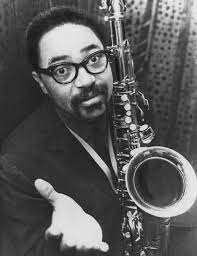Randy Weston has no end of praise for Booker Ervin. Weston’s tonal portrait of his mother, “Portrait of Vivian,” was introduced on his 1963 recording, African Cookbook. He says that “only Booker Ervin could play the song.” And in his autobiography, African Rhythms, he says that Ervin’s solo on “Vivian” at the Monterey Jazz Festival in 1966 was “one of the greatest… I would put that solo alongside any other tenor solo. Booker literally cries on the tenor saxophone.”
Ervin worked with Weston between 1963 and ’66. The group Weston led at Monterey included Ray Copeland on trumpet, Cecil Payne on baritone sax, Vishnu Wood on bass, Lennie McBrowne on drums, and Big Black on congas. On his website, Weston points to this outfit with pride and calls it “an incredible band because number one, we had Booker Ervin, [who] for me was on the same level as John Coltrane. He was a completely original saxophonist. I don’t know anybody who played like Booker. But Booker, he was very sensitive, very quiet, not the sort of guy to push himself or talk about himself…He was a master saxophonist, and the song I wrote for my mother, ‘Portrait of Vivian,’ only he could play it; nobody else could play that song.
Video: https://www.youtube.com/watch?v=hBgwbJdN518
“In fact, African Cookbook, which I composed back in the early 60’s, was partly named after Booker because we (musicians) used to call him “Book…” Sometimes when he was playing we’d shout, “Cook, Book.” And the melody of African Cookbook was based upon Booker Ervin’s sound, a sound like the north of Africa. He would kind of take those notes and make them weave hypnotically. So, actually African Cookbook was influenced by Booker Ervin.”
Ervin’s career on the New York scene lasted only a decade before his death from kidney disease in 1969 at age 39. Notwithstanding his major contributions to the music of both Weston and Charles Mingus, he drew little attention during his lifetime, and he’s become a largely forgotten figure since. This is regrettable, for Ervin’s recordings maintain the raw power and emotional force for which they were known in their time.
We’ll hear the first of the series of “Books” that Ervin recorded for Prestige in tonight’s Jazz à la Mode. The Song Book features pianist Tommy Flanagan and includes one of the first recordings of “Come Sunday” that was made outside the realm of Ellingtonia.
Here’s a rare glimpse of Booker Ervin in action on Miles Davis’s seminal original, “Milestones.”
